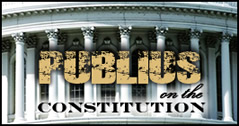By
Publius Huldah
January 23, 2016
NewsWithViews.com
Does our existing Constitution permit the federal government to spend money on whatever they want?
No! It contains precise limits on federal spending.
Federal spending is limited by the enumerated powers delegated to the federal government. If you go through the Constitution and highlight all the powers delegated to Congress and the President, you will get a complete list of the objects on which Congress is permitted to spend money. Here’s the list:
• The Census (Art. I, §2, cl. 3)
• Publishing the Journals of the House and Senate (Art. I, §5, cl. 3)
• Salaries of Senators and Representatives (Art. I, § 6, cl. 1)
• Salaries of civil officers of the United States (Art. I, §6, cl. 2 & Art. II, §1, cl. 7)
• Pay the Debts (Art. I, §8, cl. 1 & Art. VI, cl.1)
• Pay tax collectors (Art. I, §8, cl.1)
• Regulate commerce with foreign Nations, among the several States, and with Indian Tribes (Art. I, §8, cl.3)
• Immigration office (Art. I, §8, cl.4)
• The mint (Art. I, §8, cl. 5)
• Attorney General to handle the small amount of authorized federal litigation involving the national government (e.g., Art. I, §8, cls. 6 & 10)
• Post offices & post roads (Art. I, §8, cl. 7)
• Patent & copyright office (Art. I, §8, cl. 8)
• Federal courts (Art. I, §8, cl. 9 & Art. III, §1)
• Military and Militia (Art. I, §8, cls. 11-16)
• Since Congress has general legislative authority over the federal enclaves listed in Art. I, §8, next to last clause, Congress has broad spending authority over the tiny geographical areas listed in this clause.
• The President’s entertainment expenses for foreign dignitaries (Art. II, §3); and
• Since Congress had general legislative authority over the Western Territory before it was broken up into States, Congress could appropriate funds for the US Marshalls, federal judges, and the like for that Territory (Art. IV, §3, cl. 2).
That’s what Congress is authorized by our Constitution to spend money on. Did I leave anything out? I’m not infallible; so take a few minutes and, armed with a highlighter, read carefully through the Constitution and see for yourself.
Congress is to appropriate funds to carry out this handful of delegated powers; and it is to pay the bills with receipts from taxes.[1]
Pursuant to Article I, §9, clause 7, the federal government is to periodically publish a Statement and Account of Receipts and Expenditures. Citizens could use this Statement and Account - which would be so short that everyone would have time to read it - to monitor the spending of their public servants.
So that’s how our existing Constitution limits federal spending:
• If it’s on the list of enumerated powers, Congress may lawfully spend money on it.
• But if it’s not on the list, Congress usurps powers not delegated when it appropriates money for it.
It was unconstitutional spending and unconstitutional promises (Social Security, Medicare, etc., etc., etc.) which got us a national debt of almost $19 trillion, plus a hundred trillion or so in unfunded liabilities.
Since the Constitution delegates to Congress only limited and narrowly defined authority to spend money; the Constitution doesn’t provide for a budget.
We never had a federal budget until Congress passed the Budget and Accounting Act of 1921. By this time, the Progressives controlled both political parties and the federal government.
The Progressives wanted a federal budget because they wanted to spend money on objects which were not on the list of delegated powers.
A balanced budget amendment (BBA) would substitute a budget for the enumerated powers, and thus would legalize the current practice where Congress spends money on whatever they or the President put in the budget.
The result of a BBA is to legalize spending which is now unconstitutional – it changes the constitutional standard for spending from whether the object is on the list of enumerated powers to a limit on the total amount of spending.
• And to add insult to injury, the limits on spending are fictitious because they can be waived whenever Congress[2] votes to waive them.
And because a BBA would permit Congress to lawfully spend money on whatever is put in the budget, the powers of the federal government would be lawfully increased to include whatever THEY decide to put in the budget.
So a BBA would fundamentally transform our Constitution from one of enumerated powers only to one of general and unlimited powers – because the federal government would then be authorized by the Constitution to exercise power over ANY object they decide to put into the budget.
You must read proposed amendments and understand how they change our Constitution before you support them.
All federal and State officials take an oath to support the federal Constitution (Art. VI, clause 3). When people in Congress appropriate funds for objects not listed in the Constitution; and when State officials accept federal funds for objects not listed, they violate their oath to support the Constitution. According to the PEW Report, federal funds provided an average of 30% of the States’ revenue for FY 2013. Look up your State HERE. Were those federal funds used to implement unconstitutional federal programs in your State?
Power over education, medical care, agriculture, state and local law enforcement, environment, etc., is not delegated to the federal government: those powers are reserved by the States or the People. Congress spends on objects for which it has no constitutional authority; and bribes States with federal funds to induce them to implement unconstitutional federal programs. It was the unconstitutional spending which gave us this crushing $19 Trillion debt.
How do we go about downsizing the federal government to its constitutional limits?
We stop the unconstitutional and frivolous spending one can read about all over the internet.
We begin the shutdown of unconstitutional federal departments and agencies by selecting for immediate closure those which serve no useful purpose or cause actual harm such as the Departments of Energy, Education, Homeland Security, and the Environmental Protection Agency.[3]
Other unconstitutional federal departments and agencies must be dismantled and their functions returned to the States or The People.
An orderly phase-out is required of those unconstitutional federal programs in which Citizens were forced to participate – such as social security and Medicare – so that the rug is not pulled out from American Citizens who became dependent. The phase-out could be funded by sales of unconstitutionally held federal lands.
The federal government is obligated (Art. I, §8, cl. 11-16) to provide for service related injuries suffered by our Veterans.
|
|
The Constitution delegates to Congress the power to appropriate funds for “post Roads” (Art. I, §8, cl. 7). While there may be room for argument as to what is included within the term, “post Road”; clearly, some federal involvement in road building is authorized by our Constitution. State dependence on federal highway funds might be reduced by eliminating or reducing federal fuel taxes, and the substitution of fuel taxes collected by individual States. And there is nothing immoral about toll roads.
Since our Constitution was written to delegate to the federal government only the few and defined powers enumerated in the Constitution, we don’t have to change the Constitution to rein in federal spending. The Constitution isn’t the problem – ignoring it is the problem. Let us begin to enforce the Constitution we have.
� 2016 Publius Huldah - All Rights Reserved
Footnotes:
1.
Our original Constitution authorized only excise taxes & tariffs
on imports (Art. I, §8, clause 1), with any shortfall being
made up by an apportioned assessment on the States based on population
(Art. I, §2, clause 3).
2.
Compact for America’s (CFA) version of a BBA permits spending
limits to be waived whenever Congress and 26 States agree. CFA’s
version also authorizes Congress to impose a national sales tax
and a national value added tax in addition to keeping
the income tax! See THIS
Paper.
3.
George
Washington’s Cabinet had four members: Secretary
of State, Secretary of War, Secretary of Treasury, and Attorney
General.
Publius Huldah is a retired attorney who now lives in Tennessee. Before getting a law degree, she got a degree in philosophy where she specialized in political philosophy and epistemology (theories of knowledge). She now writes extensively on the U.S. Constitution, using the Federalist Papers to prove its original meaning and intent. She also shows how federal judges and politicians have ignored Our Constitution and replaced it with their personal opinions and beliefs.h
E-Mail: publiushuldah@gmail.com













 Share
This Article
Share
This Article




